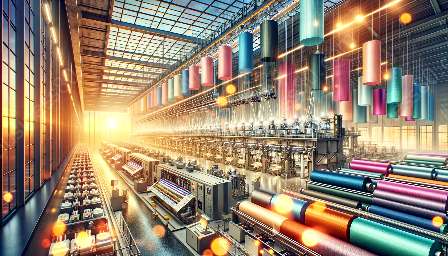Yarn manufacturing is a critical aspect of the textiles & nonwovens industry, with a significant impact on the business & industrial sectors. This comprehensive guide delves into the intricacies of yarn production, from the raw materials to the final product.
The Basics of Yarn
Yarn is a continuous strand of interlocked fibers used in the production of textiles and nonwovens. It is a fundamental component of fabric production, contributing to the texture, strength, and appearance of the finished product. Yarn can be made from natural fibers such as cotton, wool, silk, or synthetic fibers such as polyester, nylon, or acrylic.
The Yarn Manufacturing Process
The manufacturing of yarn involves several stages, each of which plays a crucial role in determining the quality and characteristics of the final product. The primary stages include:
- 1. Fiber Preparation: Raw materials such as cotton bales, wool fleeces, or synthetic polymers are cleaned, combed, and blended to create a homogeneous fiber blend suitable for spinning.
- 2. Spinning: The prepared fibers are spun into yarn using spinning machines. This process involves twisting the fibers together to create a continuous thread with the desired thickness and strength.
- 3. Yarn Dyeing and Finishing: Once the yarn is spun, it may undergo dyeing and finishing processes to add color and enhance its properties.
Technological Innovations in Yarn Manufacturing
Advancements in technology have revolutionized the yarn manufacturing process, leading to improved efficiency, consistency, and product quality. Automated spinning machines, innovative fiber blending techniques, and eco-friendly dyeing processes are examples of the technological innovations driving the yarn manufacturing industry forward.
Yarn Manufacturing and the Textiles & Nonwovens Industry
The yarn manufacturing sector plays a significant role in the textiles & nonwovens industry, providing the essential raw material for fabric production. The quality and diversity of yarn options available directly impact the variety and performance of textiles and nonwovens in the market, making yarn manufacturing a cornerstone of this industry.
Business & Industrial Implications
From a business and industrial perspective, yarn manufacturing influences various aspects of the supply chain, including procurement, production, and distribution. The demand for specific types of yarn, changes in consumer preferences, and global market dynamics have a direct impact on the business decisions of textile manufacturers and industrial stakeholders.
Conclusion
Yarn manufacturing is a fascinating blend of art and science, encompassing traditional craftsmanship and cutting-edge technology. Its impact on the textiles & nonwovens and business & industrial sectors underscores its vital role in the global economy. Understanding the intricacies of yarn manufacturing is essential for anyone involved in these industries, from textile enthusiasts to business professionals.

